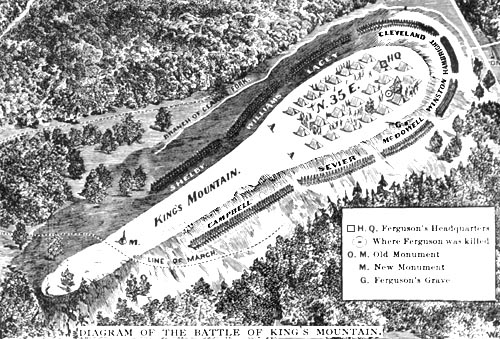
The RevWar/Colonial History/General Washington ping list...and those on the list, please ping your Southron Freeper friends that would like this info.
However, I would like to soften the critcism a bit (although what he says is basically true, IMO). The battles that have always gotten the most ink were those that General Washington was present for, and he stayed in the north until Yorktown.

The RevWar/Colonial History/General Washington ping list...and those on the list, please ping your Southron Freeper friends that would like this info.
bttt
The South was where the British Army met it’s (pardon the pun) Waterloo.Ironically the American southern troops were led by a Yankee name Nathanael Greene and greatly aided by New Jersey General Daniel Morgan. Washington was stalemated by British General Henry Clinton in New York so it took the southern theater to turn the Revolution in the American favor and TURN IT IN OUR FAVOR IT DID !!!
Partisans & Redcoats by Walter Edgar tells this story well.
The War Between the States has been almost a paragon of history being written by the victor, though that has slowly been changing.
George wasn’t in the 1st set of battles - Lexington/Concord, and “Bunker Hill”.
They get LOTS of ink. More than any George battle. Perhaps because they’re the 1st.
“I can go back to my classroom this fall with a much stronger sense of how close we came to losing the war, if not for the victories down here — far away from New England.”
Wow, that sort of proves my “bigotted” point about New England from last week.
She mentions New England. Yet only the very 1st battles and the siege of Boston, and later Newport, really happened up there. (Burlington is debatable, since noone could agree if it was VT or NY - but it certainly wasn’t mainstream NE at the time.) Until Arnold’s invasion of his old neighbors after Yorktown. Otherwise, a few skirmishes.
Most of the “George” battles were New York and below. Yet even this woman had to mention it as if it was all about New England.
I didn't vote for our Junior Senator but I recommend his book.
If the central role of the South in the Revelation is a generally unknown fact, the presence of significant southern mountain sentiment for Lincoln and the Union is another.
In the later years of the war, the British assumed that they could win over a majority of South Carolinians to their cause, but Banastre Tarleton's brutality and other Redcoat outrages worked to the benefit of the revolutionaries. The Waxhaw massacre and other atrocities turned the state against the monarchy.
The first phase of the war occurred in New England. After the New England Colonies were freed of British forces the action moved to the Middle Colonies and then the South. The British reckoned they'd have more support in provinces where the Anglican influence was stronger, so there was no attempt to retake New England.
A lot of the troops who fought in the later phases of the war were still New Englanders who'd signed on earlier, though. That was particularly true in the Middle Colonies -- New York and Philadelphia were still in British hands and troops were tied up in battles there. But the 1st Rhode Island Regiment fought at Yorktown. It had been reorganized in 1778 as an all African-American unit.
American History PING, in case you weren’t included in the earlier ping.